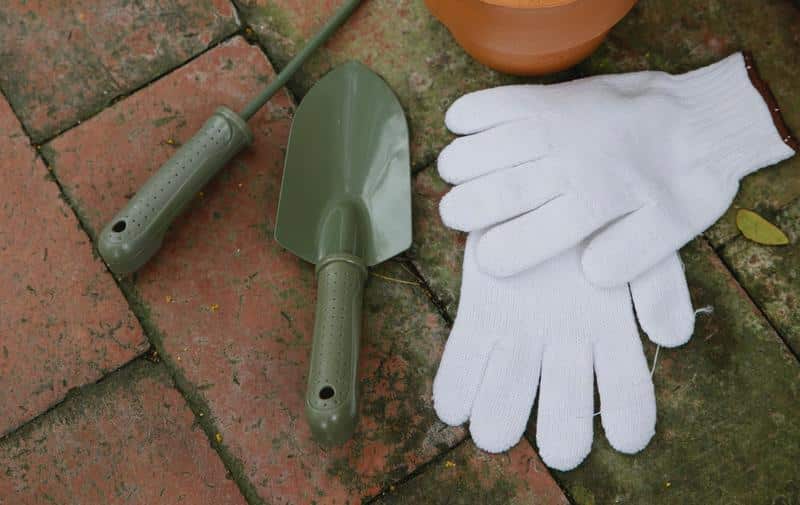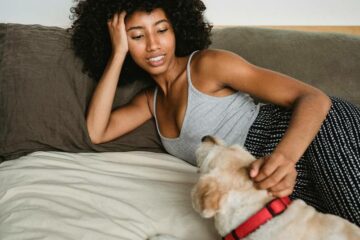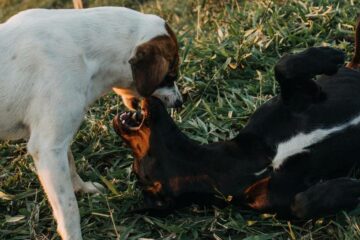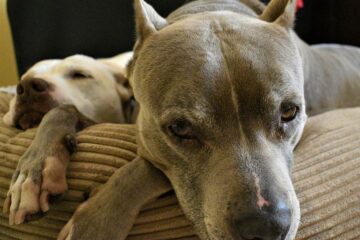Dog Ate a Gardening Glove? What to Do + How to Stop It! [10 Steps]
Has your dog ever eaten or chewed on your gardening gloves? Believe it or not, you’re not alone! In “Dog Ate a Gardening Glove? What to Do + How to Stop It!”, we’ll explore the reasons why dogs might be attracted to your gloves and how to put an end to this behavior.
We’ll also get into the possible reasons behind their glove-chewing habit and discuss what you should do if your dog actually ingests one. We’ll also address whether or not a dog can digest leather from a glove and if it’s possible for them to pass a swallowed gardening glove.
Ready to find out more and get back to gardening without worrying about your gloves? Keep reading below!
How to Stop Your Dog from Eating Gardening Gloves

To stop dog chewing or eating gardening gloves:
- Keep your gloves hidden away somewhere that your dog can’t get to them.
- Ensure your dog always has available a safe outlet for their chewing such as a toy they have fun playing with.
- Spray something to deter your dog, such as a 50/50 mix of distilled white vinegar and water onto the gloves.
- The scent of vinegar will not be detectable after around 60 minutes, but your dog will still be repelled.
- Give a calm, firm “stop” or “no” the second when you notice that your dog is biting the gloves.
- Do not yell or get mad, because if they’re behaving like this due to anxiety (which is the most probable explanation), this will only make their issues worse.
- Put them into a short time-out in a closed-off room or their crate for about ten minutes.
- If you observe your dog starting to go for the gloves, point them to one of their toys.
- Reward them with praise, a small treat, and praise when they choose their toy instead of chewing on the gloves.
- Make sure that everyone else in the house is also following these procedures while being consistent and patient.
This will get your dog to stop chewing gloves, but you can’t forget that the issues which were most likely causing all of this in the first place (anxiety and boredom) will still be present. And you absolutely must address those, because not doing so means that your dog will continue suffering and misbehaving in different (possibly worse) ways.
To properly cover that, we must first talk about what makes dogs tick and has for thousands and thousands of years now. You’ve likely heard before that all dogs are pack animals, and that in every pack there is a pack leader.
But when your dog chews gardening gloves, they are without a doubt proving to you that they don’t trust you as the head of the family pack.
If they did, they wouldn’t chew up your gloves over and over again despite your commands to stop. They wouldn’t engage in any other types of misbehavior or disrespect. And they would obey your commands at all times — happily — and they would do so immediately.
Show your dog that you are not just their pack leader, but a capable and deserving one who they must respect, and you’ll make all of these wonderful transformations a reality.
Obviously, you’ll be better off. But your dog will be too because you’ll have freed them from all of the worry and confusion that their behavior issues are currently burdening their little shoulders with every single second of every single day.
Sounds like a great thing, don’t you think?
“Absolutely, sure, but how do I actually do this?”
You should watch a fantastic free video series which is on this exact subject — how to be your dog’s pack leader — by a renowned trainer named Dan. In the series, he explains everything in ways that are very easy to follow and teach to your own dog, and he gets right to the point so that you can start seeing these crucial changes in your dog in no time.
Start watching Dan’s free training series now by clicking here. And don’t stress, because no, you’re not going to have to be mean or yell at your dog. Dan never uses those types of methods. Not just because loving teaching techniques are the right thing to do, but also because they’re the fastest way to achieve permanent changes in your dog’s behavior.
Why Do Dogs Eat or Chew Gardening Gloves?
Dogs eat or chew gardening gloves primarily due to anxiety, boredom, or teething. Anxiety can cause your dog to chew on things as a way to self-soothe and find comfort. Boredom can also lead to destructive chewing if your dog isn’t mentally stimulated or lacks physical exercise. Lastly, teething puppies will chew on things to alleviate the discomfort of their new teeth coming in.
Addressing your dog’s anxiety or boredom is crucial to prevent them from turning to destructive chewing as a coping mechanism. Providing a safe and comfortable environment, offering mental stimulation, and ensuring they get enough physical exercise can help alleviate these issues. If your dog is a teething puppy, make sure to provide appropriate chew toys to help with their discomfort.
Keeping your gardening gloves out of your dog’s reach is the obvious first step, but it’s crucial to recognize that this won’t address the actual root cause of the problem. Your dog will merely seek out other items to chew destructively in order to alleviate their issues.
Your dog may chew pruning shears, chew wheelbarrow tire, chew rake, or chew sprinkler heads. Virtually any accessible object could become a tempting target. It’s clear now why addressing the core issue is so essential. To learn the exact steps to do this, go back to the first section of this article now.
What Should I Do if My Dog Eats a Glove?
If your dog eats a glove, consult your veterinarian immediately. Eating a glove can potentially cause a dangerous blockage in your dog’s digestive system. Your vet may advise you to monitor your dog for symptoms such as vomiting, diarrhea, loss of appetite, or lethargy, which could indicate a blockage.
In some cases, your veterinarian may recommend inducing vomiting or using other methods to remove the glove. In more severe situations, surgery might be necessary to remove the obstruction. It’s important to act quickly and follow your vet’s guidance to ensure your dog’s safety.
Why Does My Dog Take My Gloves?
Dogs take gloves for a variety of reasons, such as seeking attention, playing, or simply being attracted to the smell. If your dog is taking your gloves to get your attention, it’s important to recognize and address the underlying issue, such as boredom or a lack of exercise. Providing them with appropriate toys and playtime can help redirect their focus.
The scent of the gloves may also be appealing to your dog, as they could carry the smell of soil, plants, or even your own scent. Remember they have very powerful noses. Ensuring your gloves are stored securely and out of reach can help prevent your dog from taking them in the first place.
Can a Dog Digest Leather From a Glove?
Dogs cannot properly digest leather from a glove. While small pieces of leather might pass through their digestive system without issue, larger pieces can cause serious problems. Undigested leather can become lodged in the stomach or intestines, leading to a blockage.
If you suspect your dog has ingested leather, keep a close eye on them for any signs of distress or discomfort, and contact your veterinarian for guidance on the appropriate course of action.
Can Dogs Pass a Swallowed Gardening Glove?
It’s possible for a dog to pass a swallowed gardening glove, but it’s not guaranteed. The size of the glove, the dog’s size, and the dog’s digestive health all factor into whether they can safely pass the glove. In some cases, a dog may be able to pass the glove naturally, while in others, it may cause a dangerous blockage.
If your dog swallows a gardening glove, you need to contact your veterinarian right away for advice on how to proceed. They may recommend monitoring your dog for any symptoms of a blockage or taking more immediate action to remove the glove.
You should now know everything you need to handle your dog’s glove-eating habits, so I’ll let you get started. Good luck with everything, and thank you for reading our article “Dog Ate a Gardening Glove? What to Do + How to Stop It!”





